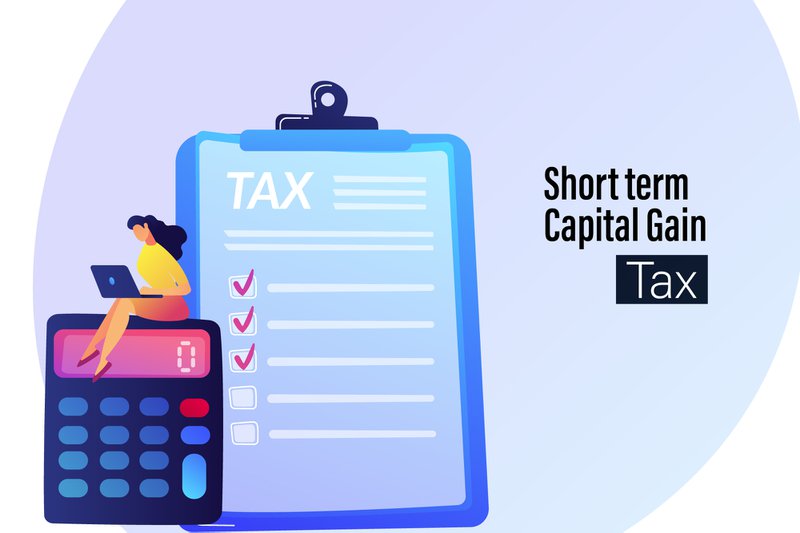Capital gains are profits arising out of the transfer of capital assets like securities, units of mutual funds, immovable property, precious stones, goodwill, etc. Gains attract tax. In the article, we will learn about the short-term capital gains tax on shares.
There are two types of capital assets in the case of listed equity shares:
- Short-term capital assets- When one holds the listed shares for less than or equal to 12 months, it is known as short-term capital assets.
- Long-term capital assets- When one holds the listed shares for more than 12 months, it is known as long-term capital assets.
To calculate short-term capital gains tax on shares it is important to understand Section 111A of the income tax act.
Section 111A: Short-term capital gains tax on shares and equity-oriented funds
Short-term capital gains from the transfer of equity-oriented funds, shares, and units of a business trust are liable to STT (securities transaction tax). However, the transfer must take place after 1/10/2004 via a recognized stock exchange. Equity oriented funds are mutual funds which invest 65% of the funds in equity shares. If one satisfies the conditions, the short-term capital gains tax on shares is 15% + 10% surcharge + 4% health and education cess.
Further, in cases other than listed shares, equity-oriented funds, and units of business trust, the short-term capital gains tax is as per normal tax rates.
Moreover, the short-term capital gains tax on shares is 15% even if STT is not payable in the following cases:
- Firstly, when the transaction takes place via a recognized stock exchange located in any International Finance Service Centre.
- Secondly, one pays or is liable to pay consideration in foreign currency.
*Securities Transaction Tax (STT)- Tax paid during purchase or sale of securities like equity shares, mutual fund units, etc.

Examples
For instance, Anand buys 100 shares of a company worth ₹1000 each on 1st June 2021. Later, he sold the shares at ₹1200 each on 31st December 2021. The transaction took place on the Bombay Stock Exchange (BSE). He also paid STT during the sale of shares.
The holding period of shares is less than 12 months (from 1/6/2021 to 31/12/2021). Hence, there is short-term capital gains.
Section 111A is applicable in the case of equity shares sold via a recognized stock exchange after 1/10/2004. Anand satisfies this condition as the shares were traded on BSE after 1/10/2004. Therefore, a short-term capital gains tax on shares of 15% is applicable. Additionally, a 10% surcharge and 4% cess are also applicable.
| Sales Consideration | 1,20,000 |
| (-) Cost of acquisition | 1,00,000 |
| Short-term capital gains | 20,000 |
| Tax at 15% on STCG (15%*20,000) | 3,000 |
| (+) Surcharge (10%*3000) | 300 |
| 3,300 | |
| (+) 4% Health and Education Cess | 132 |
| Short-Term Capital Gains Tax | 3,432 |
For example, Sagar sold 100 units of debt-oriented funds at ₹500 each. He bought the units on 31st January 2021 and sold them on 31st March 2021. He sold the units for ₹600 each.
The holding period of shares is less than 12 months (from 31/1/2021 to 31/3/2021). Hence, there is short-term capital gain.
Section 111A is applicable in the case of equity shares, equity-oriented funds, and units of business trust, sold via a recognized stock exchange after 1/10/2004. However, Sagar is dealing with debt-oriented funds. Therefore, short-term capital gains tax on debt-oriented funds is taxable as per normal rates based on his total income.

Adjusting short-term capital gains against the basic exemption limit
As per the income tax act, the basic exemption limits for an Indian resident who is an individual / HUF / Association of Person / Body of Individuals / any other artificial judicial person are as follows:
- Firstly, a person less than 60 years of age gets an exemption of up to ₹2,50,000.
- Secondly, a senior citizen (more than 60 but less than 80 years of age) gets an exemption up to ₹3,00,000.
- Lastly, very senior citizen (above 80 years of age) gets an exemption up to ₹5,00,000.
Example 1:
For instance, Mr Kelkar is a retired employee of an IT company. He is of 81 years of age and receives a monthly pension of ₹50,000. The short-term capital gains on the sale of shares amounted to ₹6,50,000. Calculate the short-term capital gains tax on shares and the total tax liability of Mr Kelkar.
Firstly, Mr Sharma is a very senior citizen. Hence, he receives a basic exemption of ₹5,00,000. His income other than short-term capital gains is ₹6,00,000 (50,000*12 months).
| Exempt up to 5,00,000 | 0 |
| 5,00,000 up to 10,00,000 (1,00,000*20%) | 20,000 |
| Above 10,00,000 (0*30%) | 0 |
| 20,000 | |
| Add: 4% Health and Education Cess | 800 |
| Income Tax Liability | 20,800 |
Further, we calculate the short-term capital gains tax on shares.
| Tax at 15% on STCG (15%*6,50,000) | 97,500 |
| (+) Surcharge (10%*97,500) | 9750 |
| 1,07,250 | |
| (+) 4% Health and Education cess | 4290 |
| Short-Term Capital Gains Tax | 1,11,540 |
| Income Tax Liability | 20,800 |
| Short-Term Capital Gains Tax | 1,11,540 |
| Total Tax Liability | 1,32,340 |
Therefore, the total tax liability for Mr Kelkar is ₹1,32,340.
Example 2:
For instance, Mr X is an employee of ABC company. He is of 40 years of age and receives a monthly salary of ₹20,000. The short-term capital gains on the sale of shares amounted to ₹60,000. Calculate the short-term capital gains tax on shares and the total tax liability of Mr X.
Firstly, Mr X is below 60 years of age. He is not a senior citizen. Hence, he receives a basic exemption of ₹2,50,000. His income other than short-term capital gains is ₹2,40,000 (20,000*12 months).
| Income from monthly pension | 2,40,000 |
| Less: Basic exemption | -2,50,000 |
| Net Taxable Income | -10,000 |
Now, Mr X can adjust the shortfall of ₹10,000 against the short-term capital gains.
| Short-term capital gains | 60,000 |
| Shortfall | -10,000 |
| Net Short-Term Capital Gains | 50,000 |
| Tax at 15% on STCG (15%* 50,000) | 7,500 |
| (+) Surcharge (10%*7,500) | 750 |
| 8,250 | |
| (+) 4% Health and Education cess | 330 |
| Short-Term Capital Gains Tax | 8,580 |
Therefore, the total taxability of Mr X is ₹8,580.
Deductions while calculating short-term capital gains tax on shares
As per the income tax act, the deductions from 80C to 80U are not applicable for short-term capital gains under section 111A. However, all other short-term capital gains which are not mentioned under section 111A can receive deductions.




